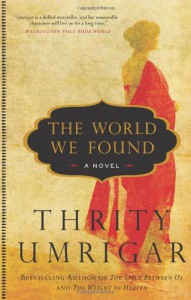 I have such mixed feelings about this one. On the plus side, it was well written, and the characters (for the most part) seemed real to me. I cared about their problems and wanted to see them resolved with the least harm done. But, that's not what happened. Oh, the "central" problem was resolved, but it was the peripheral problems that really worried me. For instance, one character, a wealthy Parsi man, used the promise of a contract for electrical supplies to get a poor Muslim man (a long lost friend from college) to come have lunch with him. He was trying to convince the Muslim to change his mind about allowing his wife to travel to America. The attempt was unsuccessful, so the Parsi walked away from the electrical shop and never thought of it again. There's no indication that he followed through on his promise of a contract -- a contract that would have substantially affected the finances of the Muslim family without being charity. It was the casualness with which this wealthy man, himself a member of a "model minority" within India, blew off his offer of doing business when he didn't get what he wanted that bothered me. It made me unable to view the character in a good light for the rest of the story. Maybe that was deliberate on the author's part, making him so morally ambiguous. If so, she it was really well done! I ended up feeling that the ensemble cast, with the exception of Kavita and Mumtaz, were a bunch of really charming people that I didn't like.
I have such mixed feelings about this one. On the plus side, it was well written, and the characters (for the most part) seemed real to me. I cared about their problems and wanted to see them resolved with the least harm done. But, that's not what happened. Oh, the "central" problem was resolved, but it was the peripheral problems that really worried me. For instance, one character, a wealthy Parsi man, used the promise of a contract for electrical supplies to get a poor Muslim man (a long lost friend from college) to come have lunch with him. He was trying to convince the Muslim to change his mind about allowing his wife to travel to America. The attempt was unsuccessful, so the Parsi walked away from the electrical shop and never thought of it again. There's no indication that he followed through on his promise of a contract -- a contract that would have substantially affected the finances of the Muslim family without being charity. It was the casualness with which this wealthy man, himself a member of a "model minority" within India, blew off his offer of doing business when he didn't get what he wanted that bothered me. It made me unable to view the character in a good light for the rest of the story. Maybe that was deliberate on the author's part, making him so morally ambiguous. If so, she it was really well done! I ended up feeling that the ensemble cast, with the exception of Kavita and Mumtaz, were a bunch of really charming people that I didn't like.After reading some other reviews (bad reviews, which are generally more informative than good ones - like Tolsoy's families, good reviews are uniformly bland, but bad reviews are much more interesting) and have second thoughts. I'm willing to concede that this book might deserve more stars than I gave it. The question turns on whether or not the author made the Laleh and Adish characters, in particular, so morally ambiguous deliberately, or whether they are simply a reflection of her own internalised sense of entitlement. Because that, I realise, is the heart of my discomfort with the novel. These are such likeable people! I'm sure they're lovely neighbors, and would be fun at a dinner party, great hosts and delightful guests...but they're rotten at the center.
Maybe the title is the key. Though they started out as revolutionaries, out to change the world, in the end, they've all defaulted to the world as they found it. Instead of changing the world, the world changed them.
God, that's depressing.



